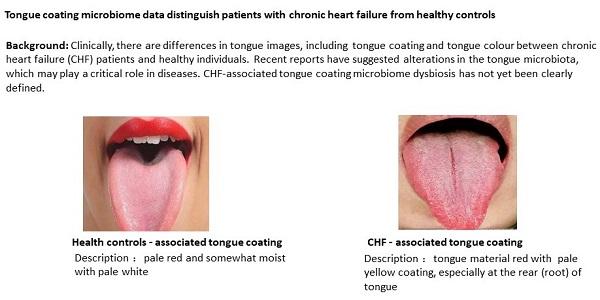
Credit: @European Society of Cardiology 2020
Sophia Antipolis – 23 June 2020: Microorganisms on the tongue could help diagnose heart failure, according to research presented today on HFA Discoveries, a scientific platform of the European Society of Cardiology (ESC).1
“The tongues of patients with chronic heart failure look totally different to those of healthy people,” said study author Dr. Tianhui Yuan, No.1 Hospital of Guangzhou University of Chinese Medicine. “Normal tongues are pale red with a pale white coating. Heart failure patients have a redder tongue with a yellow coating and the appearance changes as the disease becomes more advanced.”
“Our study found that the composition, quantity and dominant bacteria of the tongue coating differ between heart failure patients and healthy people,” she said.
Previous research has shown that microorganisms in the tongue coating could distinguish patients with pancreatic cancer from healthy people.2 The authors of that study proposed this as an early marker to diagnose pancreatic cancer. And, since certain bacteria are linked with immunity, they suggested that the microbial imbalance could stimulate inflammation and disease. Inflammation and the immune response also play a role in heart failure.3
This study investigated the composition of the tongue microbiome in participants with and without chronic heart failure. The study enrolled 42 patients in hospital with chronic heart failure and 28 healthy controls. None of the participants had oral, tongue or dental diseases? had suffered an upper respiratory tract infection in the past week? had used antibiotics and immunosuppressants in the past week? or were pregnant or lactating.
Stainless steel spoons were used to take samples of the tongue coating in the morning, before participants had brushed their teeth or eaten breakfast. A technique called 16S rRNA gene sequencing was used to identify bacteria in the samples.
The researchers found that heart failure patients shared the same types of microorganisms in their tongue coating. Healthy people also shared the same microbes. There was no overlap in bacterial content between the two groups.
At the genus level, five categories of bacteria distinguished heart failure patients from healthy people with an area under the curve (AUC) of 0.84 (where 1.0 is a 100% accurate prediction and 0.5 is a random finding).
In addition, there was a downward trend in levels of Eubacterium and Solobacterium with increasingly advanced heart failure.
Dr. Yuan said: “More research is needed, but our results suggest that tongue microbes, which are easy to obtain, could assist with wide-scale screening, diagnosis, and long-term monitoring of heart failure. The underlying mechanisms connecting microorganisms in the tongue coating with heart function deserve further study.”
###
Authors: ESC Press Office
Tel: +33 (0)4 89 87 20 85
Mobile: +33 (0)7 8531 2036
Email: [email protected]
Follow us on Twitter @ESCardioNews
Notes to editor
Funding: (1)National Natural Science Foundation (No. 81704036); (2) National Clinical Research Base of Traditional Chinese Medicine ([2018]131).
Disclosures: All the funds were from the administration. In the research process, there was no possibility for judgement and behaviour to be influence by economic, social relations and academic reputation interests.
References and notes
1Abstract title: Tongue coating microbiome data distinguish patients with chronic heart failure from healthy.
2Lu H, Ren Z, Li A, et al. Tongue Coating Microbiome Data Distinguish Patients With Pancreatic Head Cancer From Healthy Controls. J Oral Microbiol. 2019;11:1563409.
3Zhang Y, Bauersachs J, Langer HF. Immune Mechanisms in Heart Failure. Eur J Heart Fail. 2017;19:1379-1389.
To find out more about heart failure, visit the Heart Failure Matters website. Including information and practical tips on https:/
About HFA Discoveries #HFADiscoveries
HFA Discoveries is an online event from the Heart Failure Association (HFA) of the European Society of Cardiology (ESC). Explore the scientific programme and register here to access the live sessions.
About the Heart Failure Association
The Heart Failure Association (HFA) is a branch of the European Society of Cardiology (ESC). Its aim is to improve quality of life and longevity, through better prevention, diagnosis and treatment of heart failure, including the establishment of networks for its management, education and research.
About the European Society of Cardiology
The European Society of Cardiology brings together health care professionals from more than 150 countries, working to advance cardiovascular medicine and help people lead longer, healthier lives.
Media Contact
ESC Press Office
[email protected]




